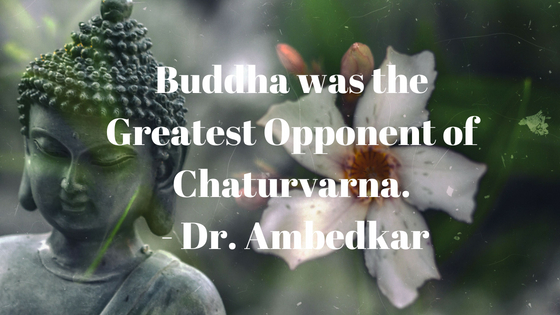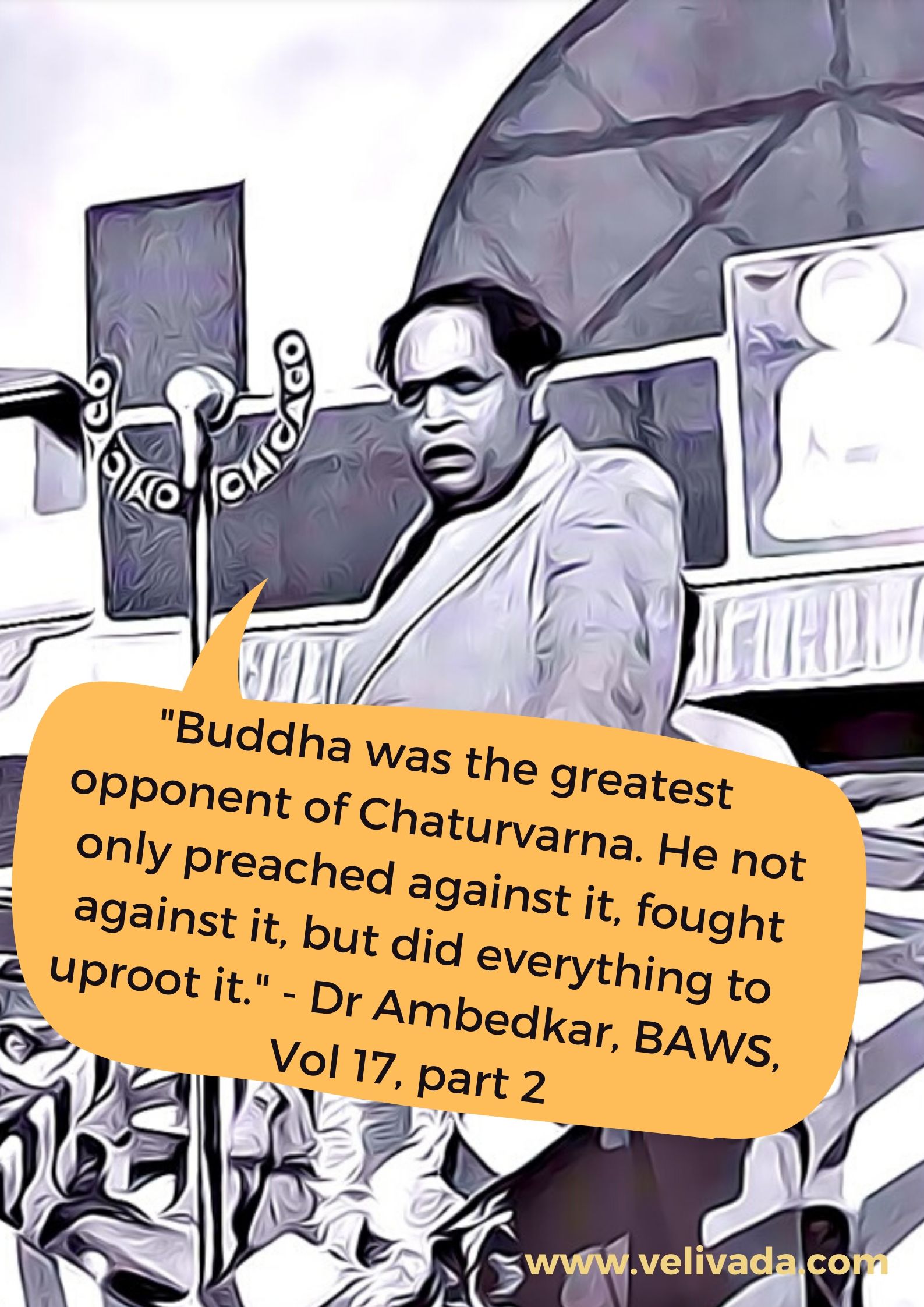
Buddha was the Greatest Opponent of Chaturvarna – Dr. Ambedkar
The point of contrast (between Hinduism and Buddhism) lies in the fact that the official gospel of Hinduism is inequality. The doctrine of Chaturvarna is the concrete embodiment of this gospel of inequality.
On the other hand Buddha stood for equality. He was the greatest opponent of Chaturvarna. He not only preached against it, fought against it, but did everything to uproot it.
According to Hinduism neither a Shudra nor a woman could become a teacher of religion nor could they take Sannyasa and reach God. Buddha on the other hand admitted Shudras to the Bhikkhu Sangha. He also admitted women to become Bhikkhunis. Why did he do so? Few people seem to realise the importance of this step.
The answer is that Buddha wanted to take concrete steps to destroy the gospel of inequality. Hinduism had to make many changes in its doctrines as a result of an attack made by Buddha. It gave up Himsa. It was prepared to give up the doctrine of the infallibility of the Vedas.
On the point of Chaturvarna neither side was prepared to yield. Buddha was not prepared to give up his opposition to the doctrine of Chaturvarna, That is the reason why Brahmanism has so much more hatred and antagonism against Buddhism than it has against Jainism.
Hinduism has to recognise the force of the Buddha’s arguments against Chaturvarna. But instead of yielding to its logic Hinduism developed a new philosophic justification for Chaturvarna. This new philosophic justification is to be found in the Bhagvat Geeta. Nobody is able to say for certain what the Bhagvat Geeta teaches. But this much is beyond question that the Bhagvat Geeta upholds the doctrine of Chaturvarna. In fact it appears that this was the main purpose for which it was written.
And how does the Bhagvat Geeta justify it? Krishna says that he as God created the system of Chaturvarna and he constructed it on the basis of the theory of Guna – Karma which means that he prescribed the status and occupation of every individual in accordance with his innate gunas (or qualities). Two things are clear. One is that this theory is new. The old theory was different.
According to the old theory the foundation of Chaturvarna was the authority of the Vedas. As the Vedas were infallible so was the system of Chaturvarna on which it rested.
The attack of the Buddha on the infallibility of the Vedas had destroyed the validity of this old foundation of Chaturvarna. It is quite natural that Hinduism which was not prepared to give up Chaturvarna and which it regarded as its very soul should attempt to find for it a better foundation which the Bhagvat Geeta proposes to do.
But how good is this new justification given by Krishna in the Bhagvat Geeta? To most Hindus it appears to be quite convincing, so convincing that they believe it to be irrefutable. Even to many non-Hindus it appears to be very plausible, very enticing.
If the Chaturvarna had depended only on the authority of the Vedas I am sure it would have long disappeared. It is the mischievous and false doctrine of the Bhagvat Geeta which has given this Chaturvarna-which is the parent of the caste system-apparently a perpetual loss of life.

The basic conception of this new doctrine is taken from the Sankhya philosophy. There is nothing original about it. The originality of Krishna lies in applying it to justify Chaturvarna. It is in its application that the fallacy lies, Kapila, the author of the Sankhya system held that there is no God, that God is necessary only because matter is believed to be dead. But matter is not dead. It is active. Matter consists of three Gunas : Raj, Tamas and Satva. Prakriti appears to be dead only because the three gunas are in an equilibrium. When the equilibrium is disturbed by one of the gunas becoming dominant over the other two, Prakriti becomes active. This is the sum and substance of the Sankhya philosophy. There can be no quarrel with this theory. It is perhaps true.
It may therefore be granted that each individual as a form of Prakriti is made up of the three gunas. It may even be granted that among the three gunas there is a competition for dominance of one over the other. But how could it be granted that a particular guna in a particular individual which at one time—say at the time of his birth-happens to dominate his other gunas will continue to dominate them for all times, till his death? There is no ground for this assumption either in the Sankhya philosophy or in actual experience.
Unfortunately neither Hitler nor Mussolini were born when Krishna propounded his theory. Krishna would have found considerable difficulty in explaining how a signboard painter and a bricklayer could become dictators capable of dominating the world.
The point of the matter is that the Prakriti of an individual is always changing because the relative position of the gunas is always changing. If the gunas are ever changing in their relative position of dominance there can be no permanent and fixed system of classification of men into varnas and no permanent and fixed assignment of occupations. The whole theory of the Bhagvat Geeta therefore falls to the ground.
But as I have said the Hindus have become infatuated by its plausibility and its “good look” and have become slaves of it. The result is that Hinduism continues to uphold the Varna system with its gospel of social inequality.
– Dr Ambedkar, Writing and Speeches, Vol 17 (2) [No paragraph-breaks in the original text, paragraph-breaks added to make reading easier.]



Mahatma Gautama Buddha was the greatest personalities in the world history. He was a great rationalist and a great revolutionary. Buddha was the first person to challenge the satanic racist cult based on the shrutis and smritis, called Vedic Dharma/Hinduism (Brahminism). Buddha was also the first man to challenge the evil and inhuman hegemony of the Brahmins. I am considering to embrace Buddhism, i.e., accept Buddha and his Dhamma as my religion.
Dear Supravat, It’s great to know that you are considering following the Buddha’s teachings. Just don’t refer to the Buddha as mahatma. The preferred ‘title’ is ‘Tathagatha’. Some say Bhagwan Buddha